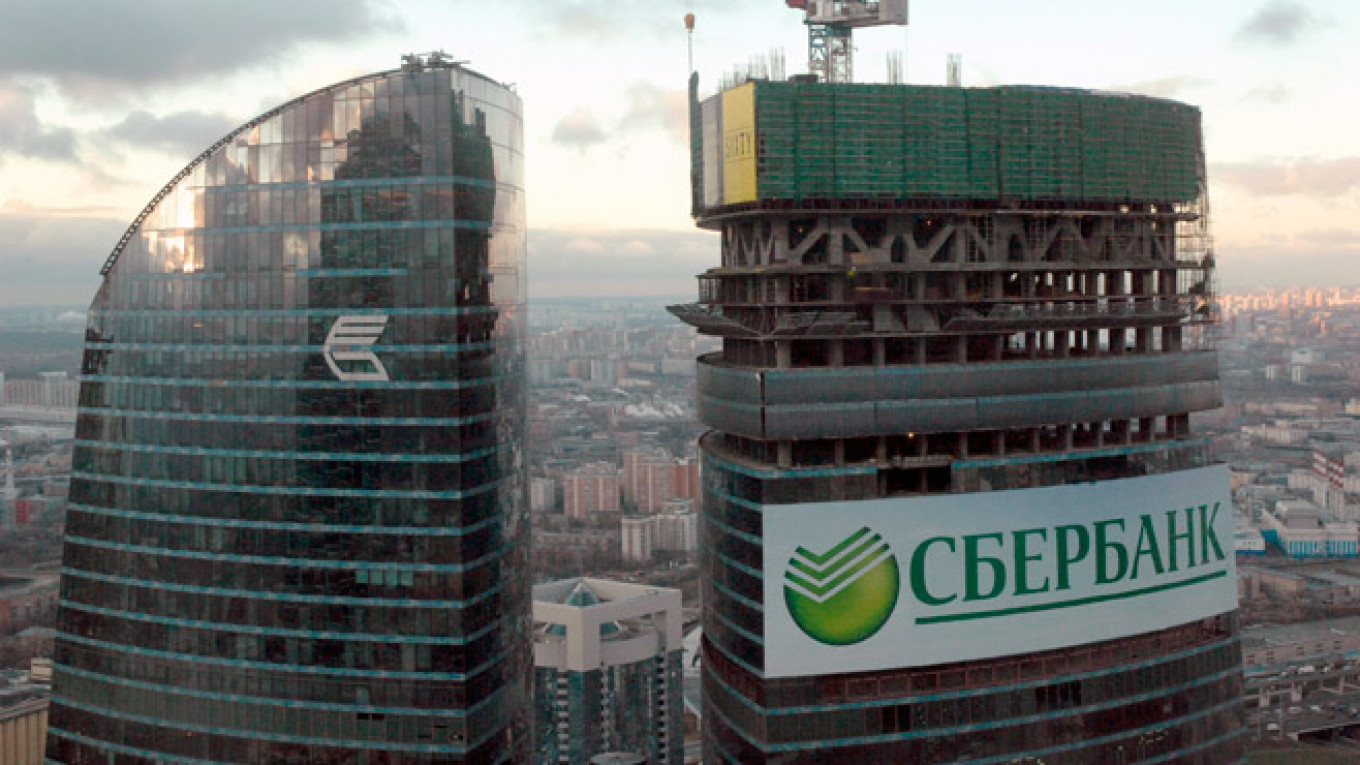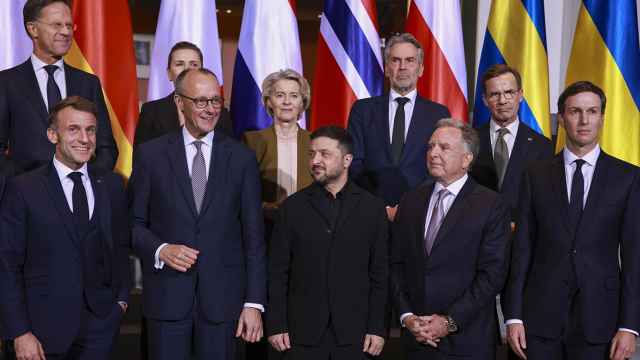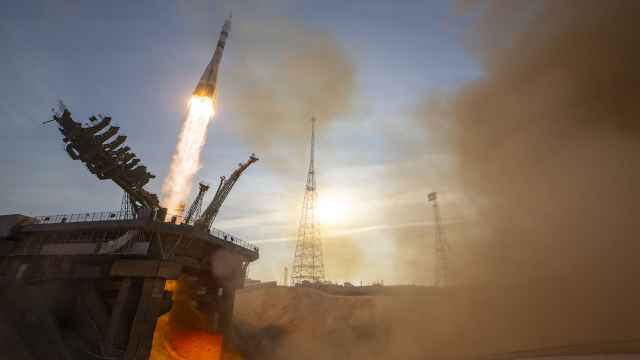BRUSSELS — The European Union would target state-owned Russian banks vital to financing Moscow's faltering economy in the most serious sanctions so far over the Ukraine crisis under proposals considered by EU governments on Thursday.
Ambassadors of the 28-nation bloc met in Brussels to discuss options drafted by the executive European Commission in response to the downing of a Malaysian airliner in an area of eastern Ukraine held by Russian-backed separatists.
Decisions are likely next week at the earliest.
In one key measure, European investors would be banned from buying new debt or shares of banks owned 50 percent or more by the state. These banks raised almost half of their 15.8 billion euro ($21 billion) capital needs in EU markets last year.
"If implemented such sanctions would be a serious blow to the Russian economy, exacerbating an already very likely recession this year and sustaining an economic depression for longer," said analyst Michal Dybula of BNP Paribas.
The proposals included an arms embargo, although diplomats said it would apply to future deals and would not bar delivery of a French warship built for Russia under a 2011 contract.
The EU was also weighing restricting exports of technology for deep-sea drilling, shale and Arctic energy exploration and so-called civilian-military "dual use" items, diplomats said.
After months of hesitation, powerful EU states including Germany, Moscow's biggest trade partner, are pushing for quick action as they believe Russia has consistently failed to meet international demands to end violence in Ukraine.
The crash of Malaysia Airlines Flight MH17, which U.S. intelligence officials believe was shot down in error by the rebels with a Russian-supplied missile, has stiffened Europe's resolve, officials said. Most of the victims were Dutch.
The moves to restrict access to EU capital markets and defense and energy technology would mark the first time the Europeans have gone beyond asset freezes and visa bans to target sensitive sectors of the Russian economy.
The Commission did not propose a ban on buying Russian government bonds. However, the cost of insuring Russian sovereign debt against default rose on the news.
The largest banks with state ownership of more than 50 percent are Sberbank, VTB, Rosselkhozbank and Vneshekonombank.
"Restricting access to capital markets for Russian state-owned financial institutions would increase their cost of raising funds and constrain their ability to finance the Russian economy," the Commission's options paper said.
"It would also foster a climate of market uncertainty that is likely to affect the business environment in Russia and accelerate capital outflows," it said.
Merkel Wants Action
A spokesman for German Chancellor Angela Merkel said on Wednesday she wanted to see quick decisions, adding that EU leaders had expressed their readiness last week to hold a special summit if necessary to approve the measures.
European Commission spokesman Jonathan Todd said once member states had decided what they wanted to do, the EU executive would draw up formal legislative proposals which he expected to be adopted by governments next week.
They must also decide how long the EU will give Russia to comply with its demands before imposing the sanctions.
The proposals were designed to spread the burden among the main EU powers, affecting German technology, Britain's financial center and French defense sales. Trade data show Germany and Italy have the most to lose if the EU steps up sanctions. Austria and the Baltic states are also heavily dependent on Russian gas.
German officials told a closed-door Brussels briefing for industry representatives that Berlin favors a time limit on the new sanctions to provide an opportunity for relations to return to normal, an EU source said.
Despite German urgency, several diplomats said they believed a further ambassadorial meeting would be required next week.
Ambassadors were expected to agree on Thursday to add the names of some Russian companies accused of helping to undermine Ukraine's sovereignty to the bloc's sanctions list, using new expanded criteria.
EU foreign ministers said this week that to avoid tougher sanctions, Moscow must stop the flow of weapons across the border to Ukraine and use its influence with pro-Russian rebels in Ukraine to allow an independent investigation into the downing of Flight MH17 with the loss of 298 lives.
Despite threatening tough action since Russia's annexation of Ukraine's Crimea region in March, the EU has been divided over imposing economic sanctions on its main gas supplier.
Britain and France have clashed openly over Paris's plan to deliver the first of two Mistral helicopter carriers to Moscow.
It it remains uncertain whether EU leaders would hold an extraordinary summit to approve sanctions or whether governments could approve the decision in writing.
It may take until next week to publish a first list of people and companies targeted with asset freezes under the wider measure. Ambassadors were also working on additional measures to restrict EU trade with and investment in Crimea.
Experts said capital market sanctions could strain Russia's foreign exchange reserves over time and spark more selling.
"If the corporates and banks lose access you will have to keep an eye on the hard currency reserves, because they would have to rely on the Russian Central Bank to provide the dollars to fund their external debt," said Viktor Szabo, portfolio manager at Aberdeen Asset Management in London.
It was not a short-term problem, but more of an issue on a two to three-year horizon, he said.
Michel Danechi, portfolio manager at Swiss fund manager EI Sturdza, said he was staying away from sanctioned companies.
"[Sanctions are] an ongoing process but we can't say still that share prices of companies such as Novatek and Rosneft have fallen to bombed-out levels. People are underweight Russia but that does not mean more selling cannot happen because investor confidence is quite fragile," he said.
See also:
A Message from The Moscow Times:
Dear readers,
We are facing unprecedented challenges. Russia's Prosecutor General's Office has designated The Moscow Times as an "undesirable" organization, criminalizing our work and putting our staff at risk of prosecution. This follows our earlier unjust labeling as a "foreign agent."
These actions are direct attempts to silence independent journalism in Russia. The authorities claim our work "discredits the decisions of the Russian leadership." We see things differently: we strive to provide accurate, unbiased reporting on Russia.
We, the journalists of The Moscow Times, refuse to be silenced. But to continue our work, we need your help.
Your support, no matter how small, makes a world of difference. If you can, please support us monthly starting from just $2. It's quick to set up, and every contribution makes a significant impact.
By supporting The Moscow Times, you're defending open, independent journalism in the face of repression. Thank you for standing with us.
Remind me later.






